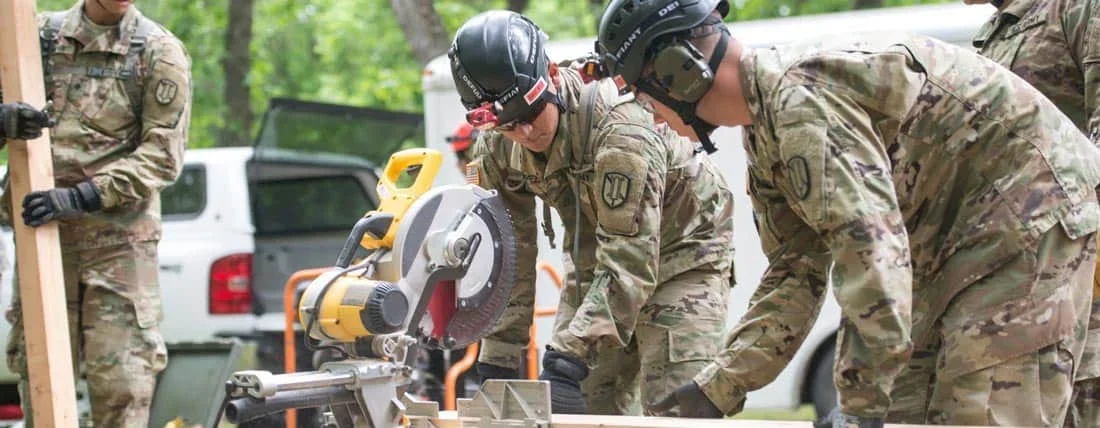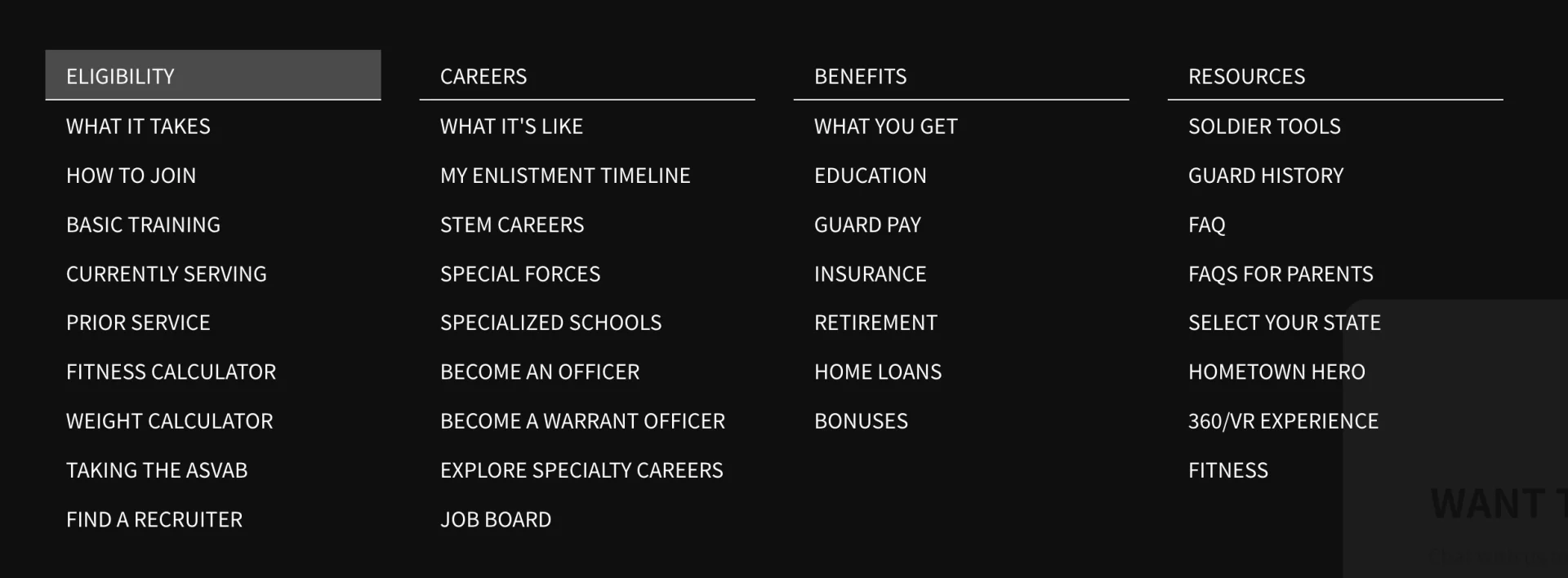
Throughout America’s brief history, its volunteer-based Army has been blessed with extremely talented individuals. There are stereotypes; however, that members of the Army have strived to dismantle for decades. These stereotypes include: A Soldier cannot think for themself, a Soldier joined the Army as a last resort, or a Soldier’s skills will not translate to the civilian world. These stereotypes are not ignored; in fact, leaders in the Army make it their mission to help make their Soldiers as educated, empowered, and marketable as possible.
There is a new “bigger picture” in the Army, a picture that requires not only able bodies but bright minds. Many parents have the Army-of-old stuck in their heads to no fault. Recruiters with the Your State Army National Guard (YSARNG) asked parents what their biggest objections, questions, and misunderstandings were before their child enlisted in the YSARNG. Here is what they said:
Ten weeks. Name a profession that, in ten weeks can make an individual a loyal, disciplined, and confident member of a team. We understand that your child leaving home came quicker than you expected. After your child finishes Basic Combat Training and Advanced Individual Training (AIT), They are back home to Your State. Advanced Individual Training can last anywhere between 4-30 weeks depending on the Military Occupational Specialty (MOS), or job. During this time, and even during Basic Training, your child will have the ability to call home. It’s a safe assumption that during Basic Training, your child will receive one, five-minute phone call per week.
The transformation that your child will go through will make the time away all worth it! If you can attend their graduation, you will see the pride in their eyes as they strongly stand in their dress uniform. The Your State Army National Guard is a part-time commitment with full-time benefits and opportunities. These opportunities will be discussed momentarily.
Debt-free Soldier has a nice ring to it. People often find themselves in the dilemma of choosing EITHER the military or college. This decision fails to recognize that BOTH are possible, and not only that, many students are Soldiers at the same time. The Your State Army National Guard looks for any way to incentivize continuing education.
Firstly, we incentivize higher education with rank. Each college credit hour translates into one promotion point. Secondly, we offer various types of state and federal tuition assistance. We extend these funds as a “Thank you” as you grow in your education while serving your state and country. In many cases, the tuition incentives end up being a “Full-ride” situation. Finally, let’s say that you are finished with college. The Your State Army National Guard offers up to $50,000 with the Student Loan Repayment Program. This is an incredible opportunity to eliminate student debt and put your degree to use.
Although there is a chance of your child getting deployed, the odds are relatively low. There are jobs in the Your State Army National Guard that deploy more than others, based on the unit’s skillset. In recent years, our Soldiers have provided aid to the state at much-needed times. Crucial missions like COVID-19 aid, firefighting, and aerial surveillance were carried out by the Your State Army National Guard.
“Imagine practicing all season but never playing the game.” We do not shy away from any mission we are called to do. We cannot promise that your child will never be deployed; however, we can promise that The Your State Army National Guard will equip a deploying unit with the leadership, training, and equipment needed for the success and safety of the unit.
The compensation for a Soldier in the Your State Army National Guard can be best summed up by saying; “Part-time earnings with full-time benefits.” A Private makes roughly $250 on a drill weekend and $750 for annual training. While attending Basic Training, a Private will make roughly $1500 a month. Now let’s get into the benefits.
Retirement- The Your State Army National Guard offers the Thrift Savings Plan (TSP). The TSP closely resembles a 401(k). Soldiers are reminded to maximize the benefits of the TSP, and the Your State Army National Guard also offers financial management counseling to Soldiers at no cost. Learn more about the Thrift Savings Plan.
Insurance- Soldiers in the Your State Army National Guard have access to Tricare. Tricare is a highly affordable insurance provider that adapts to a Soldier’s needs at any stage in their life. Learn more about Tricare
Enlistment Bonuses- Each quarter, new bonuses are offered to different MOSs. Bonuses range in dollar amounts, and how many years of obligation. After a Soldier’s first contract is over, re-enlistment bonuses are also offered! $20,000 for six years of service is an example of a bonus. There are terms to these bonuses; however, it is money that many Soldiers use to renovate their home, buy a new camper, etc.
The Your State Army National Guard is a success multiplier. Almost every industry is represented in the YSARNG. We have/need doctors, plumbers, computer programmers, engineers, chefs, the list goes on. Army training equals civilian success. You can get a CDL through the Army, you can hold a security clearance to open doors to federal employment, and you can earn training certificates through the Army that leads to higher earnings in the civilian sector.
The Your State Army National Guard also has many full-time opportunities available to Soldiers. The Army may have different standards and procedures for how a job gets done compared to the civilian sector, but the skills crossover is just the same. The Your State Army National Guard creates Soldiers who have the stereotype of being hard-working, dedicated employees.
I. Introduction
A. Brief overview of stereotypes surrounding the Army and the efforts to dismantle them.
II. Leaving Home
A. Overview of the duration of Basic Combat Training and Advanced Individual Training.
B. Communication allowances during training.
C. Highlighting the transformation and pride experienced by recruits.
III. Joining the Army or Going to College
A. Dispelling the misconception of choosing either the military or college.
B. Incentives for higher education, including rank promotions and tuition assistance.
C. Student Loan Repayment Program as a means to eliminate debt.
IV. Chances of Getting Deployed
A. Discussion on deployment likelihood and variability based on units.
B. Examples of recent missions carried out by the Your State Army National Guard.
C. Assurances of equipping deploying units for success and safety.
V. Compensation for Their Commitment
A. Overview of part-time earnings and full-time benefits.
B. Retirement options through the Thrift Savings Plan.
C. Access to Tricare insurance and enlistment bonuses.
VI. MOS and the Crossover into the Civilian Sector
A. Highlighting the diversity of industries represented in the YSARNG.
B. Discussion on skill crossover and opportunities for civilian success.
C. Mention of full-time opportunities within the Your State Army National Guard.
VII. Conclusion
A. Acknowledgment of parents’ role and encouragement to attend recruitment meetings.
B. Emphasis on discipline and determination as keys to success.
C. Invitation for further discussions with recruiters about the future and success of recruits.
New Image Uploaded: Recruiting and Retention Campaign materials have been updated. Please review the latest visuals.

Quisque rutrum. Curabitur ligula sapien, tincidunt non, euismod vitae, posuere imperdiet, leo. Fusce vel dui. Integer tincidunt. Nam pretium turpis et arcu.
Lorem ipsum dolor sit amet, consectetur adipiscing elit. Ut elit tellus,